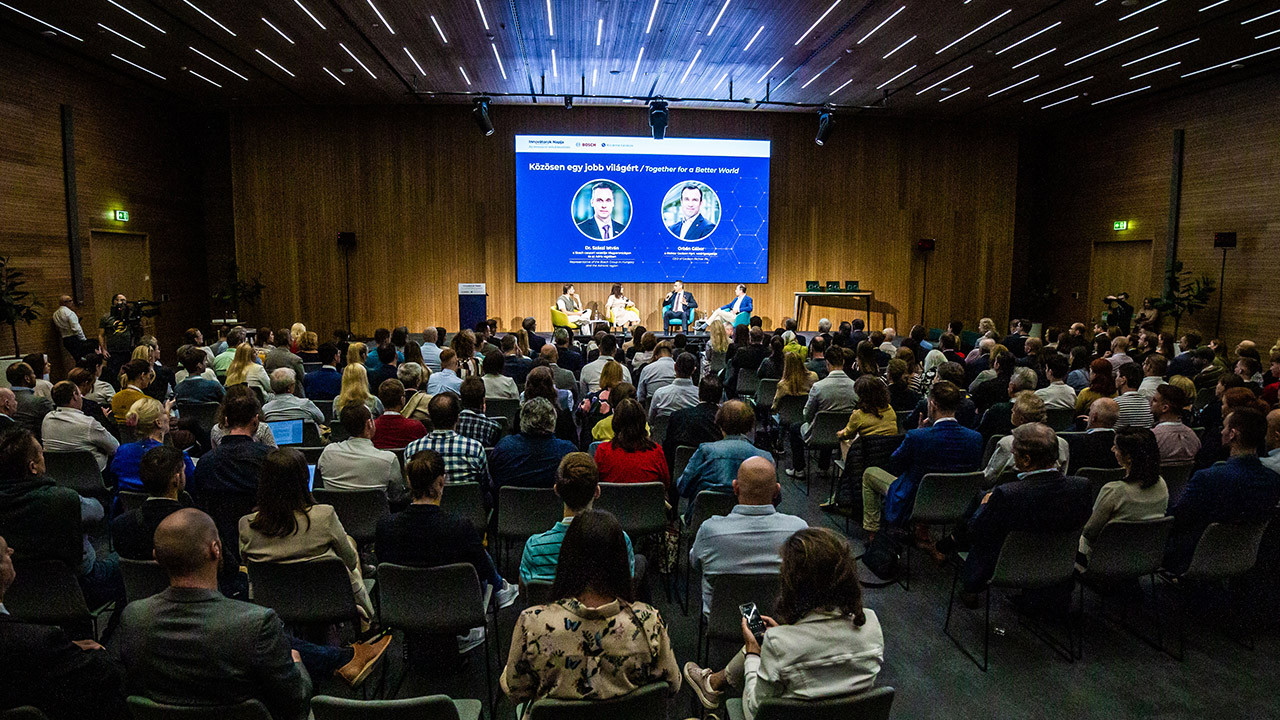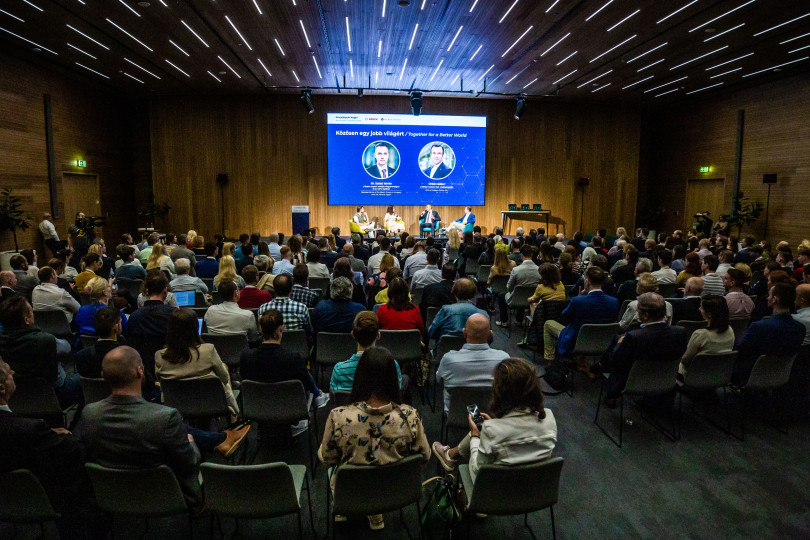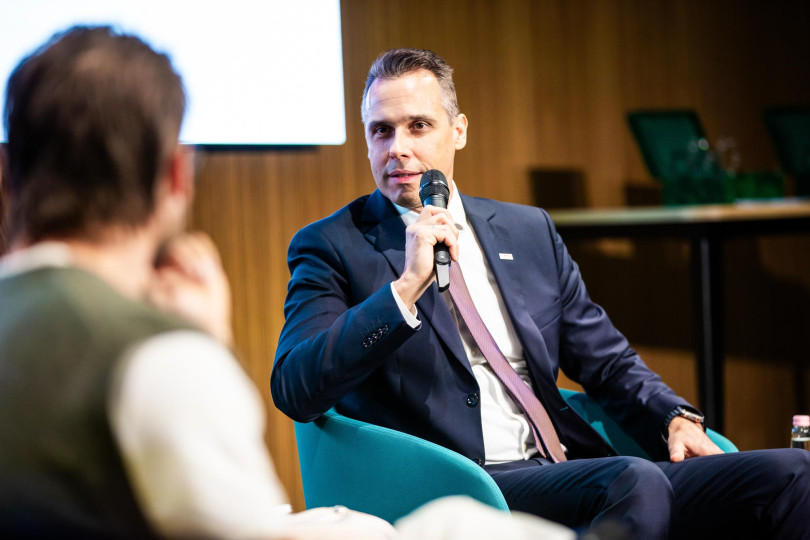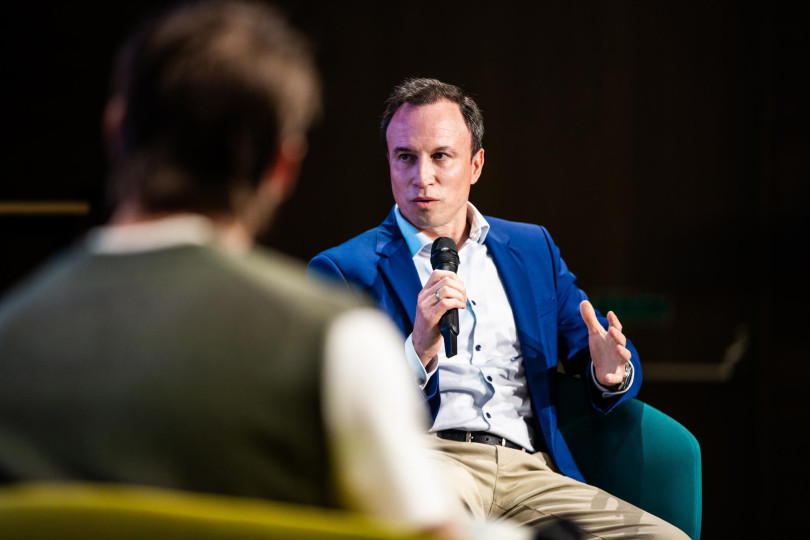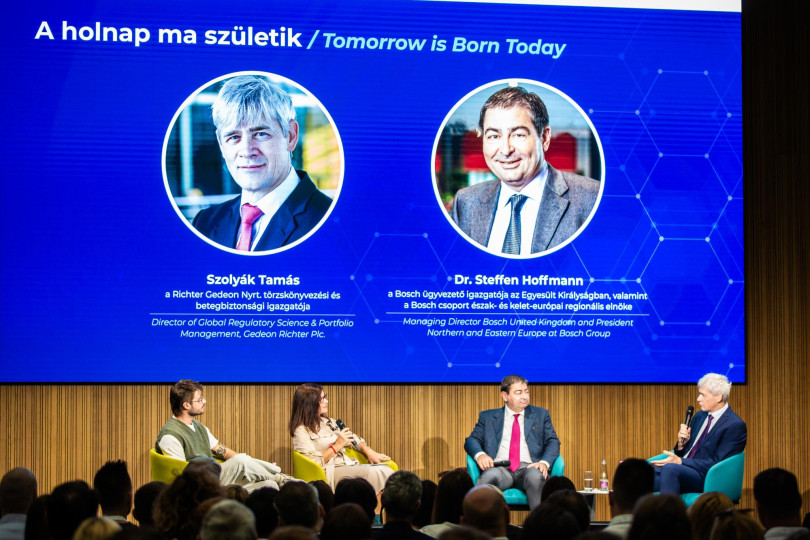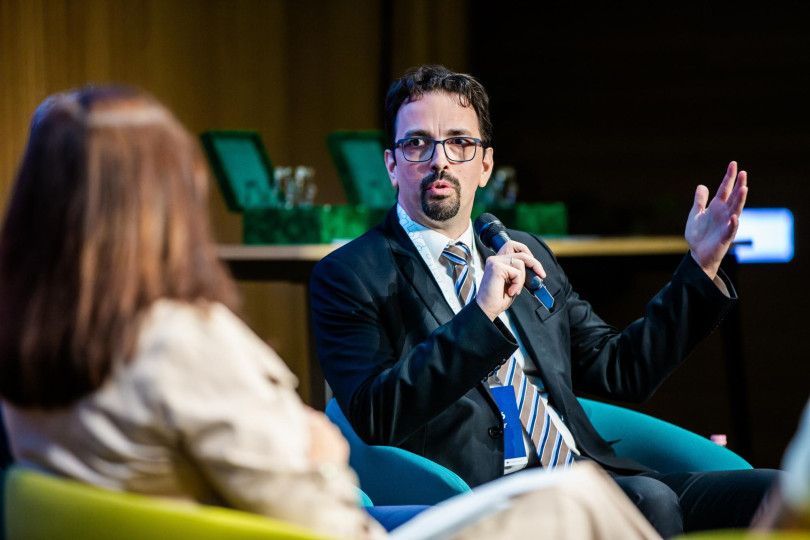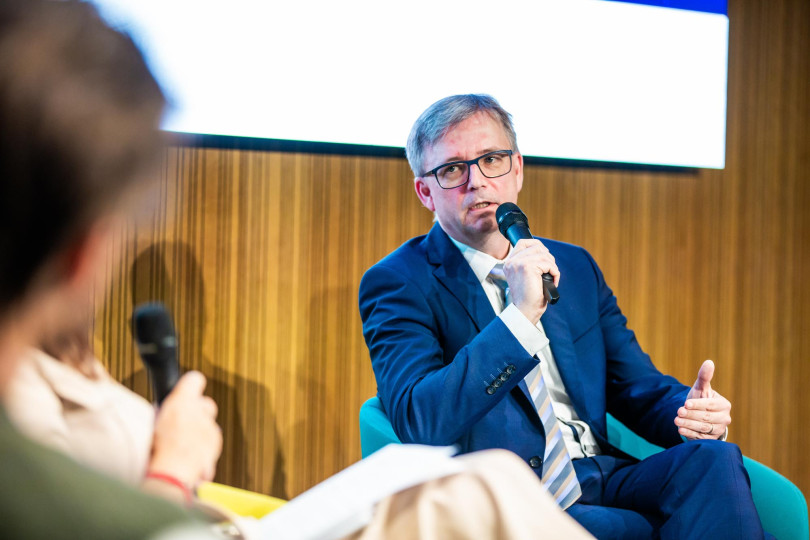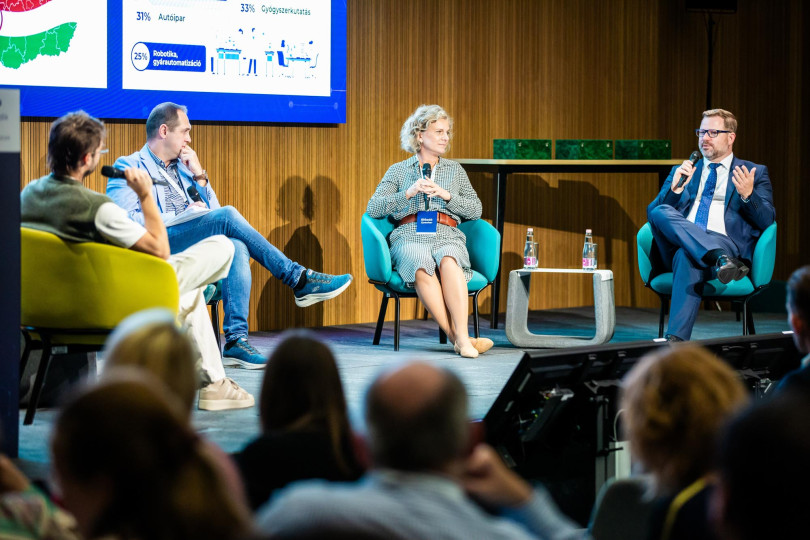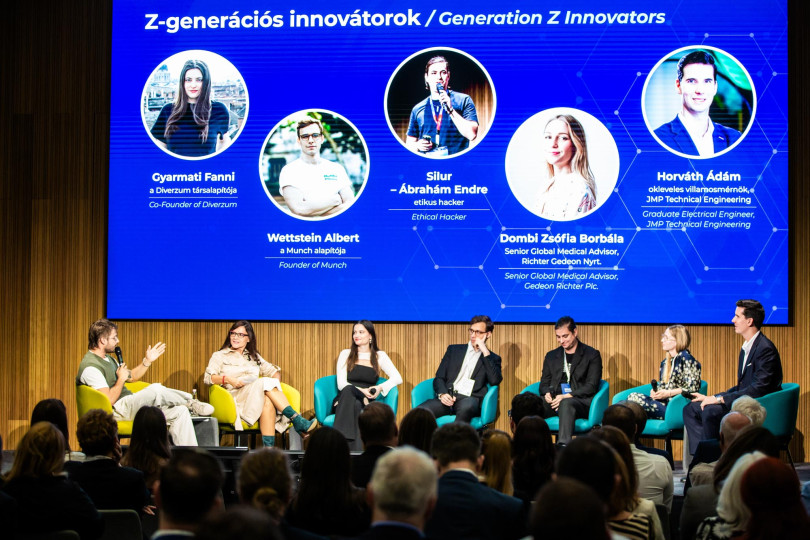Budapest – Global competition is intensifying. A strong innovation ecosystem and support for the training of talented young people is a key element of a successful European economy. The innovative lifestyle, positive error culture and the importance of collaboration were also discussed at the conference ‘Generation Z – The new generation of innovators’, held on the occasion of this year's Bosch×Richter Innovators' Day at the Bosch Budapest Innovation Campus.
In a race for excellence: young people can make Europe stronger
Innovative technologies that are changing everything come in waves, sometimes making their way to unexpected places at unexpected times. Countries that are at the forefront of innovation can gain a decisive competitive advantage. Improving competitiveness is a priority for Europe, and the key to this is to strengthen the innovation ecosystem and empower the next generation, say experts from the Bosch Group and Gedeon Richter Plc.
Bosch is committed to the principle of openness and technological neutrality, as we do not know what tomorrow will bring and which technology will be the best solution. European regulation inevitably limits innovation, but young talent must be given room to flourish, because this is the only way for Europe to be competitive in the world.
Richter shares the same view: while innovation in drug development is accelerating and new technologies could help treat more and more diseases, the industry in Europe is somewhat over-regulated and innovation is slower to reach the market than in the US or Asia. It is therefore important for large companies to invest in knowledge and give future generations the opportunity to make the most of their potential.
Positive error culture – a change of mindset may be needed to succeed
Bosch and Richter managers agreed that a positive error culture can foster creativity and innovation. “In the world of innovation and research and development, a mistake is not really a mistake, but an attempt that did not succeed. You must dare to try, you must dare to make mistakes in order to have new solutions, but it is also important to recognize when an idea is not viable and has no future,” said Dr István Szászi, representative of the Bosch Group in Hungary and in the Adria region.
“As a large innovative company, we need to ensure predictability and reliability at the same time as relying on the energy of young people for research and development. We must be able to separate these two needs, but in the innovation field we have to allow room for trial and error. Our task is to create an environment in which new ideas can emerge and sprout, so that we can achieve real change,” said Gábor Orbán, CEO of Gedeon Richter Plc.
An innovative way of life, or swimming against the tide – how startuppers see it
“Being an innovator is both an attitude and a way of life,” this was revealed at the Bosch×Richter Innovators' Day, where the audience got a glimpse into the life of successful startups such as the well-known Munch or the popular Diverzum, but also young innovators from the corporate side shared their experiences.
“Startuppers are stubborn, impatient, destructive in a good way, not wanting to fit into existing systems, but rather wanting to move the world forward. This requires them to embrace conflict, to defy the norm, to believe what many don't, that they can do better,” says Albert Wettstein, founder of Munch.
According to Fanni Gyarmati, co-founder of Diverzum, an innovative entrepreneur and startupper is someone who, when faced with a problem, tries to solve it, not wait for someone else to do it. But to do that, it's not enough to start working on the problem, you also have to see it through. “You must be persistent and work hard to get to the point where the idea takes off,” this is the view of Zsófia Borbála Dombi, who recently was lauded at a prestigious international conference as a young researcher at Gedeon Richter Plc.
The personal experience of Ádám Horváth, a Generation Z engineer at Bosch, is that there is potential for innovative ideas not only in the startup scene, but also in large companies with a pioneering approach. “Bosch already has a special department for startup-like operations called Innohub, which was created to help innovative initiatives succeed,” said the member of Bosch's Junior Managers Program for young talent.
Collaboration and inspiration – teamwork in the corporate world
Shared experiences and teamwork are a priority for Generation Z on a personal level, but Bosch and Richter have also committed to similar values and comprehensive collaborations in the corporate world. Both companies have created their own innovation ecosystem in the fields of engineering and pharmaceuticals, which is also an incubator for innovative training of professionals and joint research and development.
“Our close cooperation with industry, academia, the start-up sector, as well as with local governments, government agencies and higher education institutions, aims to develop Hungary's innovative strength and competitiveness,” said András Kemler, head of real estate management of the Bosch Group in Hungary and the Adriatic region. This idea was echoed by Bori Varga, a student at the ELTE-Bosch Department of Industrial Artificial Intelligence, which is part of the Bosch ecosystem, who said that students are exposed to many Bosch project topics in class, receive personal mentoring and tools in addition to the scholarship, and have access to a wide range of instruments and measurement data. By learning about the latest technologies used in industry, they will gain marketable knowledge and later participate in real industrial developments at Bosch.
At Richter, the leadership and responsibility of the large corporation within the innovation ecosystem is paramount. In their case, we are talking about networked collaborations, working with the academic and higher education sectors to find solutions to three unmet medical needs. “Gedeon Richter's goal is to work with the various players within the innovation ecosystem network to ensure the long-term sustainability of domestic pharmaceutical manufacturing and pharmaceutical R&D in Hungary, even 100-200 years from now,” summarized the goals Szilárd Pércsi, Head of Office for Innovation & Scientific Relations at Gedeon Richter Plc. Henrietta Gellén, a PhD student at University of Pécs, Medical School, also believes that the innovation ecosystem is very useful. There are lots of opportunities to apply for grants at Richter, which gives researchers security. The Richter Talent Excellence PhD Fellowship, for example, brings together young researchers from different fields who would otherwise not meet, but who can get to know each other, see other research groups, get inspired and get closer to new perspectives.
Generation Z in the spotlight: culture change and organizational innovation on the agenda
Effective competitiveness and innovation cannot be achieved without the cooperation of different generations. At the Bosch×Richter Innovators' Day, generations researcher Krisztián Steigervald stressed that no generation is better or worse than another, but each is different. “Generation Z members no longer come from an authoritarian, hierarchical environment, but typically come from a democratic family model, they have had a responsive upbringing that shapes their whole outlook. For example, a Generation Z young person expects a workplace to be run from his or her perspective and not from the employer's, which is new compared to other generations,” said the generations researcher.
At Bosch and Richter, Generation Z are seen as particularly keen to have a positive impact on their work both socially and internationally, but companies' sustainability efforts also play a significant role in their decisions. Generations are also seen to have a strong influence on each other, with new types of concerns such as work-life balance being rapidly adopted by other generations. “As an employer, we have to work to ensure that members of different generations complement each other well and work together as a community, which is also a kind of innovation,” summarized András Somogyi, vice president for human resources of the Bosch Group in Hungary and the Adriatic region. “It is important to know and understand what Generation Z talents bring with them, and at the same time not to forget about the other generations,” said Katalin Erdei, Global HR Director of Gedeon Richter Plc.
Both Bosch and Richter believe that generations can effectively help each other to achieve common goals, but this requires a culture change and organizational innovation.
To see the Bosch×Richter Innovators' Day roundtable discussions, click HERE.
Zita Hella Varga
Phone: +36 70 667-6374
Bosch has been present in Hungary since 1898 with its products. After its re-establishment as a regional trading company in 1991, Bosch has grown into one of Hungary’s largest foreign industrial employers with currently eight subsidiaries. In fiscal 2023 it had total net sales of 2.207 billion forints and consolidated sales to third parties on the Hungarian market of 343 billion forints. The Bosch Group in Hungary employs more than 18,300 associates (as of December 31, 2023). In addition to its manufacturing, commercial and development business, Bosch has a network of sales and service operations that covers the entire country.
The Bosch Group is a leading global supplier of technology and services. It employs roughly 429,000 associates worldwide (as of December 31, 2023). The company generated sales of 91.6 billion euros in 2023. Its operations are divided into four business sectors: Mobility, Industrial Technology, Consumer Goods, and Energy and Building Technology. With its business activities, the company aims to use technology to help shape universal trends such as automation, electrification, digitalization, connectivity, and an orientation to sustainability. In this context, Bosch’s broad diversification across regions and industries strengthens its innovativeness and robustness. Bosch uses its proven expertise in sensor technology, software, and services to offer customers cross-domain solutions from a single source. It also applies its expertise in connectivity and artificial intelligence in order to develop and manufacture user-friendly, sustainable products. With technology that is “Invented for life,” Bosch wants to help improve quality of life and conserve natural resources. The Bosch Group comprises Robert Bosch GmbH and its roughly 470 subsidiary and regional companies in over 60 countries. Including sales and service partners, Bosch’s global manufacturing, engineering, and sales network covers nearly every country in the world. Bosch’s innovative strength is key to the company’s further development. At 136 locations across the globe, Bosch employs some 90,000 associates in research and development, of which nearly 48,000 are software engineers.
The company was set up in Stuttgart in 1886 by Robert Bosch (1861–1942) as “Workshop for Precision Mechanics and Electrical Engineering.” The special ownership structure of Robert Bosch GmbH guarantees the entrepreneurial freedom of the Bosch Group, making it possible for the company to plan over the long term and to undertake significant upfront investments in the safeguarding of its future. Ninety-four percent of the share capital of Robert Bosch GmbH is held by Robert Bosch Stiftung GmbH, a charitable foundation. The remaining shares are held by Robert Bosch GmbH and by a corporation owned by the Bosch family. The majority of voting rights are held by Robert Bosch Industrietreuhand KG. It is entrusted with the task of safeguarding the company’s long-term existence and in particular its financial independence – in line with the mission handed down in the will of the company’s founder, Robert Bosch.
Additional information is available online at www.bosch.hu, iot.boschblog.hu, www.bosch.com, www.iot.bosch.com, www.bosch-press.com, www.twitter.com/BoschPresse
About Gedeon Richter Plc.:
Headquartered in Hungary, Richter is an innovation-driven, specialized multinational pharmaceutical company. The activities of the Hungarian-directed Gedeon Richter Plc. are vertically integrated: they involve pharmaceutical manufacturing, research and development, and the corresponding sales and marketing. Its strategy is based on organic growth, complemented by targeted acquisitions, mainly in the field of gynecology. The company's mission is to preserve health and improve quality of life, including by bringing to market original and biosimilar products with high added value in areas where Richter has specific expertise in development and manufacturing. With a 123-year history, Richter has manufacturing subsidiaries in five countries in addition to its parent company and distributes its products through its own market network to almost 100 countries around the world. The Company employs nearly 12,000 people and had sales of more than 2.1 billion euros in 2023. The Richter Group relies on the commitment of its employees at home and abroad, its manufacturing and research experience of more than a century and works closely with its strategic partners to make its innovative products available worldwide.
Richter is the largest Hungarian pharmaceutical company. The company has sales activities on five continents and a direct presence in more than fifty countries. In total, the Richter Group consists of 64 member companies, of which 47 companies are active in the production and sale of pharmaceuticals, 8 companies are active in the wholesale and retail distribution of pharmaceuticals and 9 companies are active in other service activities. 93% of the Company's pharmaceutical sales are generated by its export activities: that amounted to 1,820.2 million euros in 2023. Our largest international markets are the USA, Russia, Poland, Germany and Spain.
Richter is one of the largest employers in Hungary, directly employing 5,600 people and a further 13,000 through its suppliers. Founded in 1901, Richter is the only pharmaceutical company in Hungary, which is also a dominant player on international markets, to operate without a foreign professional investor and under Hungarian management. Accordingly, the company's management makes decisions in the interests of the Hungarian national economy. Richter continues its research activities, makes investments and pays taxes in Hungary. The profits generated in foreign markets are also reinvested in Hungary, thus making a significant contribution to increasing the competitiveness of the country. In 2023, Richter's contribution to the national economy amounted to more than 188 billion forints in the form of taxes, investments and R&D expenditure.

